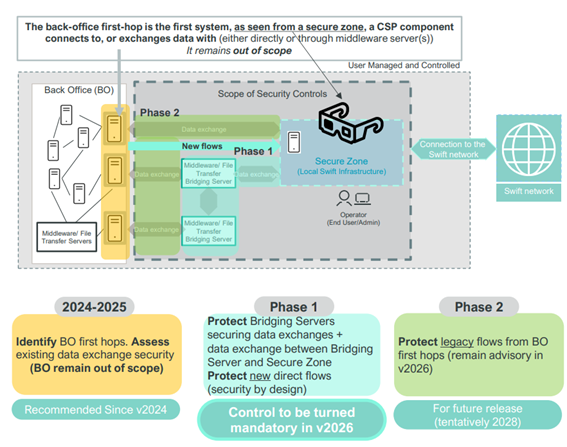Changes in Swift’s CSCF v2025

© Swift
Architecture change from Type B to A4
Are you a Type B and using an API, middleware client or file transfer client to send payments?
Swift now considers your risk to be higher than if you’d be using only a GUI to enter payments, and considers the risk similar to when using a customer connector. Therefore, these customer client connectors are now treated equally, which requires you to attest as Type A4 instead of Type B.
This transition from Architecture Type B to A4 is significant for many organisations as it entails 8 new controls in scope (4 mandatory and 4 advisory). To allow for a transition period, these 8 controls are considered advisory for v2025 and any issues identified in those controls cannot lead to a non-compliant assessment.
In short: companies who solely use a graphical user interface (GUI) (point and click) to perform payments, remain Type B. However, any company that has a technical link or any type of integration for payment messages between their back office and Swift will be reclassified to A4. Compliance with the controls newly in scope will have to be demonstrated as of v2026.
Back Office Data Flow Security becomes mandatory in v2026 (Control 2.4A)
As expected, the first phase of this flow will become mandatory in next year’s update. The control objective is to ensure the confidentiality, integrity, and authenticity of data exchanged between back-office first hops and on-premises or remote user’s Swift infrastructure components.
In simpler terms, this control is about securing communication between Swift and your back office by applying strong encryption algorithms. More details of implementation can be found in the CSCF (here) on page 50.

© Swift
Certified Assessors
At BDO, quality is at the core of what we do. We are proud to be one of the firms with the most Certified Assessors worldwide. This shows our commitment to the Swift CSP program and to delivering the highest quality assessments, all while remaining pragmatic and risk-based.
The purpose of the Swift CSP Certified Assessor certification is to increase the expert knowledge of independent assessors. It also creates a standard in assessment methodologies worldwide. This program leads to higher quality assessments, as certified assessors have a better understanding of your Swift environment and the requirements of the CSCF.
Find your nearest Certified Assessor here.
Why rely on a Swift certified assessor?
BDO’s Swift CSP Center of Excellence
To give you peace of mind about your compliance status and receive the most relevant and actionable recommendations, we created our global Center of Excellence (CoE). This framework is aimed at enhancing the effectiveness of our assessments and creating global standardisation.
Our BDO network of SWIFT CSP Certified Assessors guarantees the highest quality of service, as our assessments are performed by knowledgeable and veteran assessors.
The Center of Excellence (CoE) offers two significant advantages for your organisation:
Quality assurance: Our Certified Assessors can perform a quality review of all assessments worldwide, ensuring high-quality assessments globally. This allows you to demonstrate to your counterparties and Swift that your audit was conducted by a Certified Assessor, thereby increasing the value of your attestation.
Flexibility: BDO is active in over 160 countries across the world, delivering our exceptional service worldwide. As not all local BDO teams have the capabilities or resources to perform Swift CSP assessments, the CoE testing team can conduct the entire assessment. Performing interviews, detailed testing, and reporting following the highest quality standards. All while maintaining a close relationship between the client and the local BDO colleagues. A hybrid setup is also possible – we’re flexible by design and adapt to our client's needs!
Why BDO?
As your trusted partner, BDO will help you achieve your objectives in a pragmatic yet qualitative way.
Frequently asked questions
We get many questions from our clients and prospects regarding the scope and depth of the assessment, timelines and compliance. In the dropdowns below, we answer the most common questions.
Questions about Swift CSP? Don't hesitate to contact our expert Thomas Cornelis

Thomas Cornelis